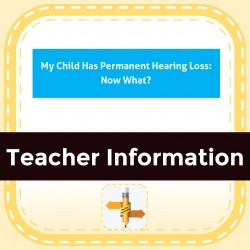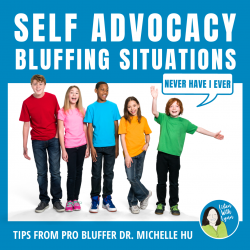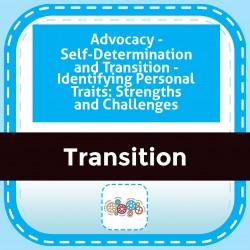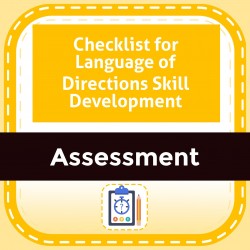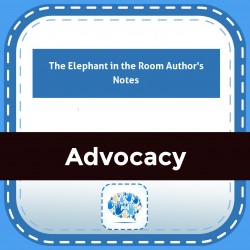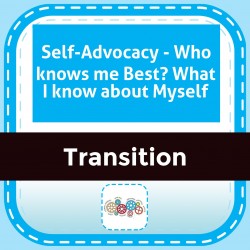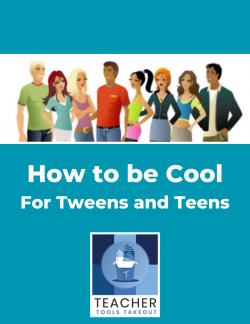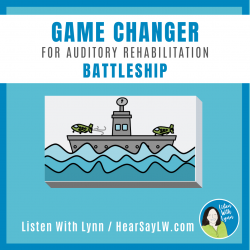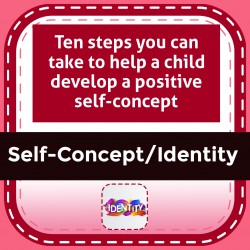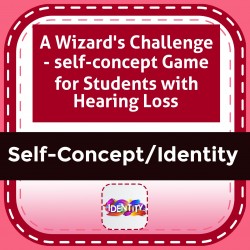Ability Levels
Categories
Resource Types
Age/Grade Range
CCSS
Anchor Standard
Speaking & Listening
Language
Reading
My Child Has Permanent Hearing Loss: Now What?
$ 0
Once a child is diagnosed with hearing loss family members have many questions. This resource provides information addressing how overwhelming the diagnosis can be and families may have many feelings
...
about the testing process and the diagnosis. It describes where you can find help and support and why it is important to start services shortly after the hearing loss is diagnosed.
Self-Advocacy Bluffing Situations - Never Have I Ever Activity
$ 7
18 Mini-Lessons target BLUFFING and foster self-advocacy and personal responsibility for kids that are deaf and hard of hearing. This resource is based on the NEVER HAVE I EVER game which is fun and m
...
and motivating for elementary and middle school-aged kids.Bluffing is pretending to hear or acting in a way that shows you understand what is being said when you are not following the conversation. Bluffing, faking, and pretending are common habits of most people with hearing loss.INCLUDED:Tips from Pro-Bluffer, Dr. Michelle Hu, a pediatric audiologist and bilateral cochlear implant recipient. Michelle knows what it is like to bluff and shares words of wisdom based on her life experiences. Follow Michelle on Instagram as she shares her hearing loss journey.18 Never Have I Ever Mini-Lessons✧ Real photos that illustrate the social situations and scenarios✧ Each situation pictures a student who says: (example) "Never Have I Ever pretended that I didn’t want to join in the game.”✧ The kids' self-talk or comments. (example) "It’s easier to not play rather than mishear and mess up."✧ Talking points with guided questions/discussion prompts.Children grapple with BLUFFING in challenging situations. Discussing possible plans of action, and exploring positive coping and communication repair strategies within a supported environment is important. Self-advocacy success requires knowledge, skills, and importantly ample practice opportunities.➼ DIGITAL - NO PRINT can be opened and played with your favorite PDF reader app on a tablet. When playing on a computer, open and use a PDF reader such as Adobe Acrobat Reader DC which is free. ➼ PRINT - Print out the 18 situations and a copy of the Discussion prompts and questions.◈ ◈ ◈ ◈ ◈ ◈ ◈ ◈ ◈ ◈ ◈ ◈ ◈ ◈ ◈ ◈ ◈ ◈ ◈ ◈ ◈ ◈ ◈ ◈ ◈ ◈ ◈ ◈ ◈ ◈ CUSTOMER TIPS➼ Questions? EMAIL ME before purchasing this resource or anytime later.♥ Sign-up HERE for the Listen With Lynn Emails♥ Let’s ConnectInstagramFacebookKeep up your good work. I am blessed to help along the way.Thanks so much!Lynn Wood
Advocacy - Self-Determination and Transition - Identifying Personal Traits: Strengths and Challenges
$ 2
We all have strengths and challenges. When we look at these parts of ourselves objectively, we can see that the things that make us happy and unhappy are really just part of our personal traits. Use t
...
hese strategies and thinking activities to encourage students' self-awareness and self-knowledge.
Checklist for Language of Directions Skill Development
$ 195
This functional checklist includes 10 examples of each of different type of question categories: one-part directions, yes/no questions, what, where, who, why, when questions. Age level expectations ar
...
e provided for each type of question category. Provides 3 columns to show test dates and check off for mastery so the checklist can be used by educators or families for progress monitoring.
The Elephant in the Room Author's Notes
$ 0
The
author explains how hearing loss
technology can improve but not restore hearing, miscommunication can happen,
and communication repair strategies.
...
Self-Advocacy - Who knows me Best? What I know about Myself
$ 195
This lesson plan includes objectives for helping students determine what they know about themselves. Students will be able to find and use descriptive words in writing about themselves and others.
How to be Cool
$ 2
Excellent discussion handout to share with tweens and teens. Based on a study of a group of teens charged with creating a list of what makes individuals 'cool' and more acceptable to peers. Provides i
...
mportant insights about individuality and standing up for who you are and what you believe in.
Auditory Rehab - Auditory Training BATTLESHIP Game
$ 6
Play Battleship the classic board game with an auditory spin using this Auditory Rehab Game Changer™. This activity is designed for individuals that are deaf and hard of hearing and for use in cochlea
...
cochlear implant rehabilitation for older children, teens, and adults.IDEAL FOR: Deaf & Hard of Hearing, Listening & Spoken Language, Auditory Training, Auditory Rehabilitation, Speech...The BATTLESHIP Game Changer✤ is played with special directions and rules✤ challenges beginner and intermediate listeners✤ works in closed and bridge listening sets✤ practices identifying words in sets and within connected speech✤ focuses on taking turns, talking while advocating for hearing needs✤ encourages gameplay and practice at home with family and friends✤ practice can lead to communication success✤ is motivating and funGameChangers™➼ result in natural listening practice much different than contrived lists or online or programs.➼ allow for real-time modifications based on the player's auditory skills➼ fosters self-advocacy skills➼ improves communication confidence and successINCLUDES:a pre-game companion that prepares the Listener to play the gamefeatures practice exercises and activities.offers clear directions for therapists, teachers, a listening coach, family members, and friendsincludes listening tips and strategiesfollows an auditory hierarchyNOTE: The amount of practice necessary will vary before a listener is ready to play the game and is dependent upon the listener’s listening skills.
Ten steps you can take to help a child develop a positive self-concept
$ 0
This informational handout provides ten stePS- you can take to help a child develop a positive self-concept. For families.
A Wizard's Challenge - Self-Concept Game for Students with Hearing Loss
$ 0
The Wizard's Challenge Game is a relevant and motivating resource which can be effectively used with students to reinforce standards based IEP goals and/or objectives in the areas of self-advocacy, se
...
lf-concept, communication repair and amplification utilization. The game relies on the players having some knowledge of the Harry Potter books or movies as it compares children with hearing loss living in families where they are the only ones who are deaf or hard of hearing to families of muggles that have a child who is a wizard or witch born into them. A parallel is drawn of Harry as 'The Boy Who Lived' being the only one with a lightening bolt scar on his face at Hogwarts to the student who is the only one using hearing devices in his or her neighborhood school. Print your own game board, cards, and game pieces.
 Your browser is out of date. For best experience switch to latest updated Browser.
Your browser is out of date. For best experience switch to latest updated Browser.
 Get Chrome
Get Chrome Get Edge
Get Edge Get Firefox
Get Firefox